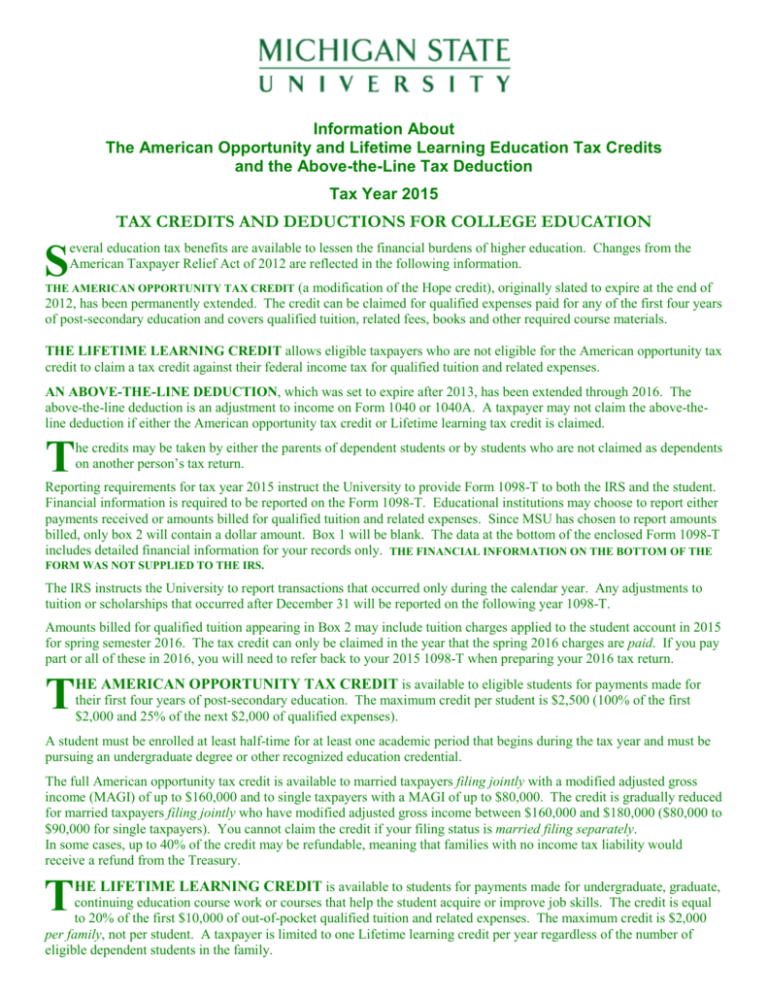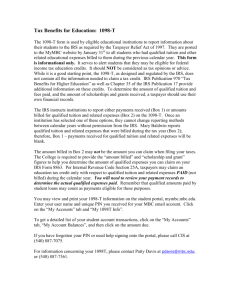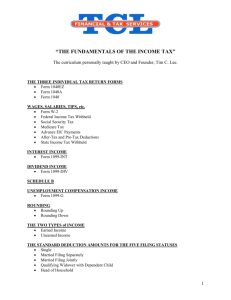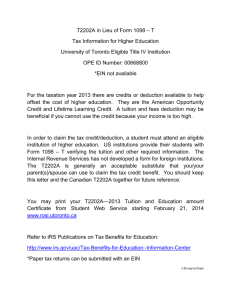Tuition Tax Credits
advertisement

Information About The American Opportunity and Lifetime Learning Education Tax Credits and the Above-the-Line Tax Deduction Tax Year 2015 TAX CREDITS AND DEDUCTIONS FOR COLLEGE EDUCATION S everal education tax benefits are available to lessen the financial burdens of higher education. Changes from the American Taxpayer Relief Act of 2012 are reflected in the following information. THE AMERICAN OPPORTUNITY TAX CREDIT (a modification of the Hope credit), originally slated to expire at the end of 2012, has been permanently extended. The credit can be claimed for qualified expenses paid for any of the first four years of post-secondary education and covers qualified tuition, related fees, books and other required course materials. THE LIFETIME LEARNING CREDIT allows eligible taxpayers who are not eligible for the American opportunity tax credit to claim a tax credit against their federal income tax for qualified tuition and related expenses. AN ABOVE-THE-LINE DEDUCTION, which was set to expire after 2013, has been extended through 2016. The above-the-line deduction is an adjustment to income on Form 1040 or 1040A. A taxpayer may not claim the above-theline deduction if either the American opportunity tax credit or Lifetime learning tax credit is claimed. T he credits may be taken by either the parents of dependent students or by students who are not claimed as dependents on another person’s tax return. Reporting requirements for tax year 2015 instruct the University to provide Form 1098-T to both the IRS and the student. Financial information is required to be reported on the Form 1098-T. Educational institutions may choose to report either payments received or amounts billed for qualified tuition and related expenses. Since MSU has chosen to report amounts billed, only box 2 will contain a dollar amount. Box 1 will be blank. The data at the bottom of the enclosed Form 1098-T includes detailed financial information for your records only. THE FINANCIAL INFORMATION ON THE BOTTOM OF THE FORM WAS NOT SUPPLIED TO THE IRS. The IRS instructs the University to report transactions that occurred only during the calendar year. Any adjustments to tuition or scholarships that occurred after December 31 will be reported on the following year 1098-T. Amounts billed for qualified tuition appearing in Box 2 may include tuition charges applied to the student account in 2015 for spring semester 2016. The tax credit can only be claimed in the year that the spring 2016 charges are paid. If you pay part or all of these in 2016, you will need to refer back to your 2015 1098-T when preparing your 2016 tax return. T HE AMERICAN OPPORTUNITY TAX CREDIT is available to eligible students for payments made for their first four years of post-secondary education. The maximum credit per student is $2,500 (100% of the first $2,000 and 25% of the next $2,000 of qualified expenses). A student must be enrolled at least half-time for at least one academic period that begins during the tax year and must be pursuing an undergraduate degree or other recognized education credential. The full American opportunity tax credit is available to married taxpayers filing jointly with a modified adjusted gross income (MAGI) of up to $160,000 and to single taxpayers with a MAGI of up to $80,000. The credit is gradually reduced for married taxpayers filing jointly who have modified adjusted gross income between $160,000 and $180,000 ($80,000 to $90,000 for single taxpayers). You cannot claim the credit if your filing status is married filing separately. In some cases, up to 40% of the credit may be refundable, meaning that families with no income tax liability would receive a refund from the Treasury. T HE LIFETIME LEARNING CREDIT is available to students for payments made for undergraduate, graduate, continuing education course work or courses that help the student acquire or improve job skills. The credit is equal to 20% of the first $10,000 of out-of-pocket qualified tuition and related expenses. The maximum credit is $2,000 per family, not per student. A taxpayer is limited to one Lifetime learning credit per year regardless of the number of eligible dependent students in the family. The Lifetime learning maximum credit is available to married taxpayers filing jointly with a modified adjusted gross income (MAGI) of up to $110,000 and to single taxpayers with a MAGI up to $55,000. The credit is gradually reduced for married taxpayers filing jointly who have modified adjusted gross income between $110,000 and $130,000 ($55,000 to $65,000 for single taxpayers). You cannot claim the credit if your filing status is married filing separately. Qualified payments include tuition and required fees but specifically exclude books, room and board, insurance, transportation, etc. Q UALIFIED PAYMENTS must be “out-of-pocket” and may include earnings, loans, inheritance, gifts, or personal savings (including savings from a qualified state tuition programs). Qualified payments do not include tax-free grants and scholarships, tax-free employer-provided educational assistance or a tax-free distribution from an Education IRA. P A REPAID EXPENSES - Qualified expenses paid in 2015 for an academic period that begins in the first 3 months of 2016 can be used in figuring your 2015 education credits. N ABOVE THE LINE DEDUCTION, which was set to expire after 2013, has been extended through 2016. The above-the-line deduction is an adjustment to income on Form 1040 or 1040A. No tuition and fees deduction is allowed if your AGI is larger than $160,000 ($80,000 for single filers) or if your filing status is married filing separately. A taxpayer may not claim the above-the-line deduction if either the American opportunity tax credit or Lifetime learning tax credit is claimed. You must choose to either take the credit or the deduction and should consider which is more beneficial for you. If your social security number or any of the information on your Form 1098-T appears to be incorrect, please contact the MSU Student Accounts Office at (517) 355-5050, or (517) 355-3343, or (800) 775-4323 if out of town. MSU cannot provide tax advice; however, if you have questions regarding the validity of the financial information shown on the Form 1098-T, please contact the MSU Student Accounts Office at (517) 355-5050, or (517) 355-3343, or (800) 775-4323 if out of town. _______________________________________________________________________________________________________________________________________ For further information about education tax credits, see: ♦ IRS Publication 970, Tax Benefits for Education. Call 1-800-TAX-FORM or retrieve through the Internet: www.irs.gov ♦ IRS Form 8863 (Education Credits) and Instructions to calculate and claim the American opportunity and Lifetime learning credits. ♦ IRS Form 8917 (Tuition and Fees Deduction) to calculate and claim the above the line deduction for tuition and fees expenses if you do not qualify for the American Opportunity or Lifetime tax credits. ♦ A personal tax advisor This information is not intended as legal or tax advice. Please consult with a personal tax advisor to determine your eligibility for education tax credits. January 2016 MSU is an affirmative-action, equal opportunity employer.





